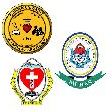ARRIVe PROJECT
This interdisciplinary project aims to tackle the pressing issue of neonatal infections in Tanzania, where antimicrobials are frequently used to combat high infant mortality rates. Our project proposes the co-development, implementation and evaluation of an AMR Information Toolkit across six wards in two hospitals in support of the national policy 'Tanzanian National Action Plan on Antimicrobial Resistance 2023-2028'.
Aims
By integrating social science, clinical and microbiological data, we aim to co-design effective strategies for reducing infection transmission and associated neonatal deaths in the two hospitals through making “invisible bugs” visible for specific responsive actions
Research questions
- How can microbiological data around the transmission of HAIs amongst neonates be ethically made visible to mothers to reduce disease transmission from mothers to neonates?
- How can routine hospital AMR surveillance data around the transmission of HAIs amongst neonates be ethically made visible to healthcare providers to improve their IPC and AMS practices within and across hospital tiers?
- How can ward-specific data be effectively communicated to hospital managers and policymakers to inform hospital and nationwide policy change

The ARRIVe Project is funded by the British Academy - ODA Challenge Oriented Research Grants 2024; and is implemented in collaboration with the University of Glasgow.
Read More
HEPI-THET PROJECT
THET is a five-year project (2018-2023) led by MUHAS, funded by Fogarty under Health-Professional Education Partnership Initiative (HEPI) program. The project will implement innovative approaches to enhance the quality of medical and nursing education and research focusing especially on HIV/AIDS by:
- Creating and adopting common training curricula for medicine and nursing education in Tanzania to ensure that the graduates of these programs from the different institutions have good quality and have common competencies
- Enhancing the academic environment to attract and retain the best early-career faculty by mentoring them to use innovative competency-based skills development and collaborate to build their research portfolios. Improving communication to reach out to main stakeholders including tracking of graduates and thus establish and sustain a robust database for the graduates in health sector in Tanzania.
- It is expected that at the end of this five-year project, the nursing and medical education in Tanzania, starting with the THET partner institutions, will use new curricula that will ensure graduates to have common clinical and research competencies across medical institutions thus address the disease burden and human resource for health challenges facing the country.
OPEN ACCESS FOR ALL PROJECT
UHABARISHAJI WA MATOKEO YA UTAFITI KWA LUGHA YA KISWAHILI
PROJECT PROFILE
WHO: Academic Institutions (Community Health Department-CUHAS and Mwanza College of Health and Allied Sciences) and local community organization (Tanzania Rural Health Movement) work on common goal of promoting dissemination of health research findings to urban-rural communities in the simplified language through friendly communication methods.
WHAT: Working to eliminate huge barrier in dissemination of medical researches among lay communities residing in urban-rural areas through proper research communication methods.
HOW: To develop audio/article-based platform where health researchers from different health disciplines can share their research findings to the community in simplified language (Swahili) during an informational discussion panel/interview with ultimate goal of fostering behavior changes in the community through correct and researched information.
WHY: In developing countries, community access to evidence-based health information is difficult since most research findings are written in scientific jargon and published in scientific journals. Thus, insufficient health knowledge in communities can result in limited understanding of disease knowledge and risk as well as accelerating infodemics among the urban-rural communities.
WHERE: The project focus to promote research communication to lay communities through dissemination of research findings to the urban-rural communities in key health messages in simplified language (Swahili) through facilitating the interdisciplinary link between health researchers and community members in an informative and community-oriented media forum as well as to empower communities to learn appropriate health information as provided in the discussion/interview panels as part of research communication initiatives.
SOPHEA
Strenghtening One Health and Planetary Health in Eastern Africa (SOPHEA)
PROJECT PROFILE
The project Strengthening One Health and Planetary Health in Eastern Africa (SOPHEA) aims to explore, investigate, teach and act on the increasing climate and environmental changes and their interactions with health within the framework of the related concepts of Planetary Health and One Health. For linguistic simplification, the term "Planetary Health" is used as a proxy for both closely related concepts. Approaching climate, environmental, and health aspects in a holistic manner has received increasing attention in recent years. The integration of these aspects into teaching is subsumed under the term Planetary Health Education (PHE). International research and teaching activities have been gradually implemented in different places. Until now, the translation to regional and local contexts as well as the establishment of academic activities have been insufficient for the Eastern African context. In the Great Lakes region, many health aspects are concentrated that interact directly with climate and environmental factors. Regional initiatives such as the Planetary Health Eastern Africa Hub (PHEAH) have produced initial efforts to set an increasing focus on Planetary Health in research and education. The aim of the SOPHEA project is to further expand these initial activities and to build up a network of scientists, health professionals and health advocates synergistically. Read More
